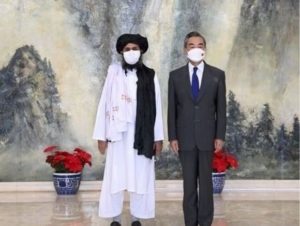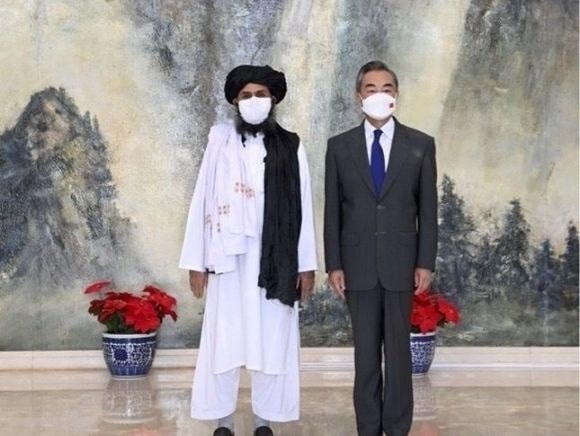While the world focuses on the U.S. debacle in Kabul, the Chinese are quietly making nice with the Taliban on the border between the two countries. Foreign policy experts in the Biden administration should be determining the nature of the Kabul-Beijing nexus and what it portends for America’s geopolitical interests. Notably, China is not alone in extending the olive branch of friendship to the Taliban.
 Russia joins China in exploring ways to exploit the relinquishing of the presence and influence of Western nations as they depart from Kabul. Nothing yet suggests a collaboration between Moscow and the Chinese Communist Party (CCP). Still, the Russian and Chinese embassies are open, and the two lost no time reaching out to the conquering new Afghan leaders.
Russia joins China in exploring ways to exploit the relinquishing of the presence and influence of Western nations as they depart from Kabul. Nothing yet suggests a collaboration between Moscow and the Chinese Communist Party (CCP). Still, the Russian and Chinese embassies are open, and the two lost no time reaching out to the conquering new Afghan leaders.
The Chinese were first to take advantage of the deteriorating situation on the ground in Afghanistan, bringing second-order consequences for the United States. This is problematic because China made a concerted outreach to the new Afghan government even before the precipitous departure of the United States. According to Reuters, “A series of photos published last month by Chinese state media of Foreign Minister Wang Yi standing shoulder to shoulder with visiting Taliban officials decked out in traditional tunic and turban raised eyebrows on the country’s social media.” The meeting, of course, was the harbinger of a more public relationship, as is becoming evident.
One factor that may motivate the CCP to cultivate cordial relations with the Islamic Emirate of Afghanistan (IEA), a.k.a. Taliban, is Beijing’s fear that Islamist jihadists and hardliners in the IEA would now turn on China. According to France 24:
“China shares a rugged 76-kilometer (47-mile) border with Afghanistan. Beijing has long feared Afghanistan could become a staging point for minority Uyghur separatists in the sensitive border region of Xinjiang. But a top-level Taliban delegation met with Chinese Foreign Minister Wang Yi in Tianjin last month, promising that Afghanistan would not be used as a base for militants. In exchange, China offered economic support and investment for Afghanistan’s reconstruction.”
As President Joe Biden withdraws from Afghanistan, China is full speed ahead to incorporate the IEA into its One Belt, One Road global economic domination plan. Reporting from Shanghai for the South China Morning Post, Rachel Zhang explained that:
“China has said it will seek to expand substantially Belt and Road Initiative projects to Afghanistan and deepen the ‘dialogue mechanism’ for the region, in an apparent effort to raise its influence after the US withdraws its troops from the country. Chinese Foreign Minister Wang Yi said that while the withdrawal of US troops might bring uncertainties regarding security, it gave the Afghan people an opportunity to ‘truly control their own destiny’ and was good for the country’s long-term stability.”

Chinese State Councilor and Foreign Minister Wang Yi meets with Mullah Abdul Ghani Baradar, political chief of Afghanistan’s Taliban, in north China’s Tianjin, July 28, 2021. (Photo by Li Ran/Xinhua via Getty Images)
Despite what may appear to be a gift to Beijing’s aspirations to expand its hegemonic influence rapidly, some observers sound a note of realism. Correspondents writing for CNN World, Nectar Gan and Steve George, explained: “‘China does not tend to perceive Afghanistan through the prism of opportunities; it is almost entirely about managing threats,’ said Andrew Small, a fellow at the German Marshall Fund in Washington, in an interview with the European Council on Foreign Relations.” So, there is ample cause for Beijing to temper its enthusiasm for buddying up with the IEA.
In July, the Taliban in Pakistan targeted and killed nine Chinese workers in a suicide bombing attack. However, threats notwithstanding, the CCP can now do what it does best – exploit a vulnerable nation’s resources. In an article published by Reuters immediately after the fall of Kabul, correspondent Pete Sweeney wrote:
“Now the United States is gone for good … Chinese state miners could help Afghanistan exploit its vast mineral reserves, valued at over $3 trillion per official estimates in 2017, while its construction companies could ram through highways, railways, and pipelines, filling what is now a vast blank space on Xi’s Belt and Road map.”
If the Biden administration thinks its challenges in Afghanistan are in the rearview mirror, it is in for a rude awakening. There is an additional strategic downside for the United States regarding regional competition with China. In its report “U.S. Forces and Allies Are Leaving Afghanistan – So Now What?” Liberty Nation explained:
“Few in the Pentagon have discussed the larger geopolitical issues surrounding the U.S. withdrawal from Afghanistan. In a commentary in Military Times, Congressman Michael Waltz (R-FL) raised his concern that when the U.S. departs bases in Afghanistan, the U.S. absence will be giving away a significant strategic advantage. His point, and a reasonable one, is that the mere presence of the U.S. provides the U.S. strategic presence should there be a conflict with China.”
The chaos and disastrously poor planning with worse execution from the national security team in Washington will make maintaining allies’ confidence in U.S. resolve as a security partner a challenge. Our principal global competitor will be consoled with what may be America’s enduring epitaph from Afghanistan. As Sweeney penned, “The United States may have wasted two decades nation-building, but China reaped a security dividend anyway.”
The views expressed are those of the author and not of any other affiliation.
~
Read more from Dave Patterson.




